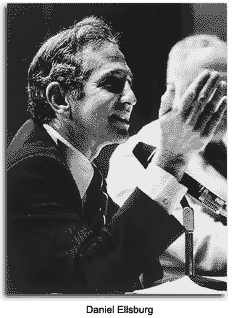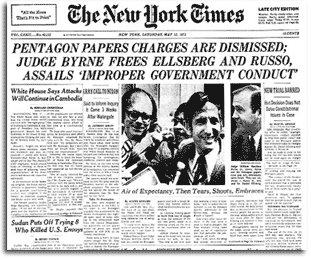"Let the eye of vigilance never be closed." -Thomas Jefferson to Spencer Roane, 1821.
Daniel Ellsberg is a former U.S. Marine and military analyst who precipitated a constitutional crisis in 1971 when he released the "Pentagon Papers." The papers comprised the U.S. military's account of theater activities during the Vietnam War. Ellsberg released top secret documents to The New York Times. His release of the Pentagon Papers succeeded in substantially eroding public support for the Vietnam War. A succession of related events, including Watergate, eventually led to President Richard M. Nixon's resignation.
The Pentagon Papers were mostly an indictment of the Democratic administration of Lyndon B. Johnson, but they fed the Nixon administration's preoccupation with finding information and document leakers. They eventually led to the secret White House "Plumbers" group and then to Watergate. In its turn, Watergate led to the first resignation of an American president, Richard M. Nixon. The Pentagon Papers contained plans to invade Vietnam, even though President Johnson had told the public that he had no intention to stage an invasion.
 Ellsberg, born April 7, 1931, grew up in Detroit, Michigan, and attended Cranbrook School, followed by Harvard University. He graduated with a Ph.D. in economics in 1959, in which he described a paradox in decision theory now known as the "Ellsberg Paradox." He served as a company commander in the Marine Corps for two years and then became an analyst at the Rand Corporation. A committed Cold War warrior, he served in the Pentagon in 1964 under Secretary of Defense Robert McNamara. He then served for two years in Vietnam as a civilian in the State Department, and became convinced that the Vietnam War was unwinnable.
Ellsberg, born April 7, 1931, grew up in Detroit, Michigan, and attended Cranbrook School, followed by Harvard University. He graduated with a Ph.D. in economics in 1959, in which he described a paradox in decision theory now known as the "Ellsberg Paradox." He served as a company commander in the Marine Corps for two years and then became an analyst at the Rand Corporation. A committed Cold War warrior, he served in the Pentagon in 1964 under Secretary of Defense Robert McNamara. He then served for two years in Vietnam as a civilian in the State Department, and became convinced that the Vietnam War was unwinnable.
Ellsberg believed there was a consensus in the Defense and State departments that the United States had no realistic chance of victory in Vietnam, but that political considerations prevented them from saying so publicly. McNamara and others continued to state in press interviews that victory was "just around the corner." As the war continued to worsen, Ellsberg became deeply disillusioned.
Working again at Rand, Ellsberg managed to procure, photocopy, then return a large number of classified or top-secret papers regarding the conduct of the war. They revealed the knowledge, early on, that the war would not likely be won and that continuing the war would lead to many times more casualties than was admitted publicly. Further, the papers showed a deep cynicism by the military towards the public and a disregard for the loss of life and injury suffered by soldiers and civilians.
Ellsberg knew that releasing that information would most likely result in his conviction and a sentence of many years in prison. Throughout 1970, Ellsberg covertly attempted to convince a few sympathetic senators, (among them J. William Fulbright, who refused to break the law), that he should release the Pentagon Papers on the Senate floor, because a Senator cannot be prosecuted for anything he says on record before the Senate. No senator was willing to do so.
Finally, Ellsberg leaked the Pentagon Papers to the Times. On June 13, 1971, the paper began to publish the first installment of the 7,000 page document. For 15 days, the Times was prevented from publishing its articles on the orders of the Nixon administration. However, the U.S. Supreme Court ordered publication to resume freely. Although the Times did not reveal the source of the leak, Ellsberg knew that the FBI would soon determine that he was the source of the leak. Ellsberg went underground, living secretly among like-minded people. He was not caught by the FBI, even though they were under enormous pressure from the Nixon Administration to find him.
 The release of those papers was politically embarrassing, not only to the incumbent Nixon Administration, but also to the previous Johnson and Kennedy administrations. Nixon's attorney general John Mitchell almost immediately issued a telegram to the Times, ordering it to halt publication. The paper refused, then the government brought suit against them. Although the Times eventually won the case before the Supreme Court, an appellate court ordered that the paper temporarily halt further publication. That was the first attempt in American history by the federal government to restrain the publication of a newspaper. Ellsberg released the Pentagon Papers to other newspapers in rapid succession, making it clear to the government that they would have to obtain injunctions against every newspaper in the country to stop the story.
The release of those papers was politically embarrassing, not only to the incumbent Nixon Administration, but also to the previous Johnson and Kennedy administrations. Nixon's attorney general John Mitchell almost immediately issued a telegram to the Times, ordering it to halt publication. The paper refused, then the government brought suit against them. Although the Times eventually won the case before the Supreme Court, an appellate court ordered that the paper temporarily halt further publication. That was the first attempt in American history by the federal government to restrain the publication of a newspaper. Ellsberg released the Pentagon Papers to other newspapers in rapid succession, making it clear to the government that they would have to obtain injunctions against every newspaper in the country to stop the story.
President Nixon made discrediting Ellsberg a high priority. Nixon's Oval Office tape from June 14, 1971, reveals H.R. Haldeman describing the situation to Nixon:
"To the ordinary guy, all this is a bunch of gobbledygook. But out of the gobbledygook comes a very clear thing: You can't trust the government; you can't believe what they say; and you can't rely on their judgment. And the implicit infallibility of presidents, which has been an accepted thing in America, is badly hurt by this, because it shows that people do things the president wants to do even though it's wrong, and the president can be wrong."
On June 28, 1971, Ellsberg publicly surrendered at the U.S. Attorney's Office in Boston. He was taken into custody believing he would spend the rest of his life in prison; he was charged with theft, conspiracy, and espionage.
In one of Nixon's actions against Ellsberg, G. Gordon Liddy and E. Howard Hunt broke into Ellsberg's psychiatrist's office in September 1971, hoping to find information they could use to discredit him. The revelation of the break-in became part of the Watergate scandal. On May 3, 1972, the White House secretly flew a dozen Cuban CIA "assets" (commandos), to Washington, D.C., with orders to assault or assassinate Ellsberg. They backed out because the crowd was too large.
Because of the gross governmental misconduct, all charges against Ellsberg were eventually dropped, a president eventually resigned, and a large segment of the American populace became disenfranchised and alienated from their government at all levels.
 Ellsberg has continued as a political activist. Recently he provoked criticism from the George W. Bush Administration for praising whistleblower* Katharine Gun, a former British Inteligence employee, and calling on others to leak any other information that reveals alleged deception regarding the 2003 invasion of Iraq. Ellsberg currently serves as a senior research associate at the Massachusetts Institute of Technology's Center for International Studies.
The latest and a most signifigant development in this saga has been the revelation in June 2005, 34 years hence, of the identity of the Watergate "Deep Throat" informant. In June 2005 91-year-old Mark Felt, a former associate director of the FBI, confirmed that he is Deep Throat.
Ellsberg has continued as a political activist. Recently he provoked criticism from the George W. Bush Administration for praising whistleblower* Katharine Gun, a former British Inteligence employee, and calling on others to leak any other information that reveals alleged deception regarding the 2003 invasion of Iraq. Ellsberg currently serves as a senior research associate at the Massachusetts Institute of Technology's Center for International Studies.
The latest and a most signifigant development in this saga has been the revelation in June 2005, 34 years hence, of the identity of the Watergate "Deep Throat" informant. In June 2005 91-year-old Mark Felt, a former associate director of the FBI, confirmed that he is Deep Throat.
The former television mystery, "The X-Files," had roots in the true saga of the Pentagon Papers and Watergate. The X-Files is fictional entertainment based upon the proposition that the truth is out there, but it may not be revealed by government before some alienated loner, out of a sense of moral justice, reveals embarrassing facts hidden from public scrutiny. One person can make a difference.
"There [are moments] in which the aid of an able pen [is] important to place things in their just attitude."
-Thomas Jefferson to James Madison, 1798.